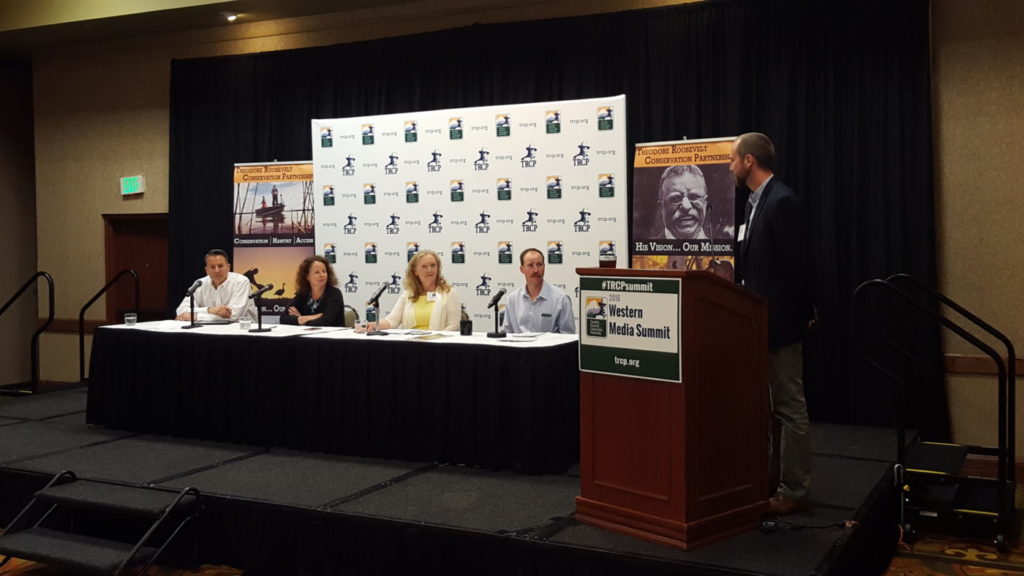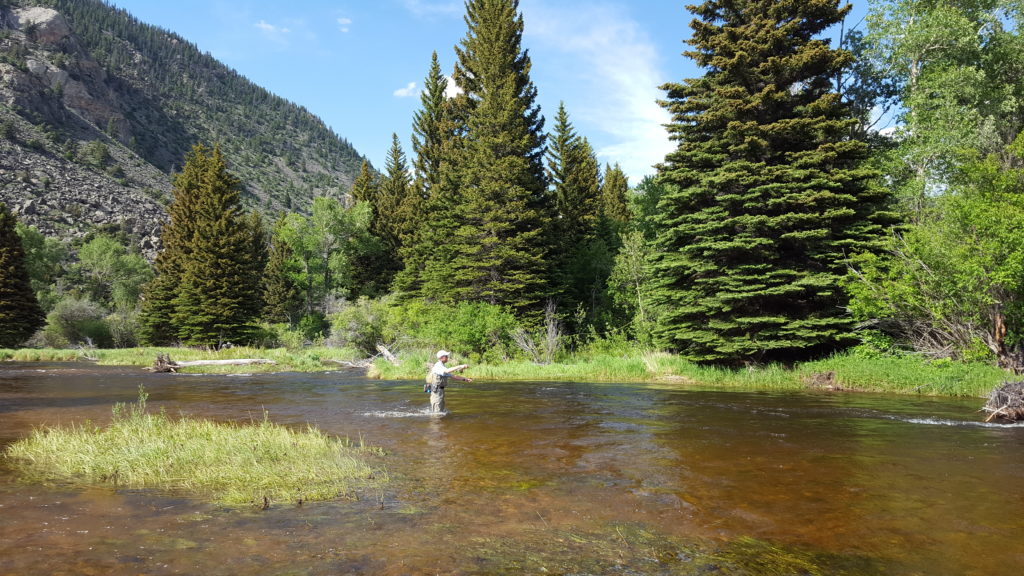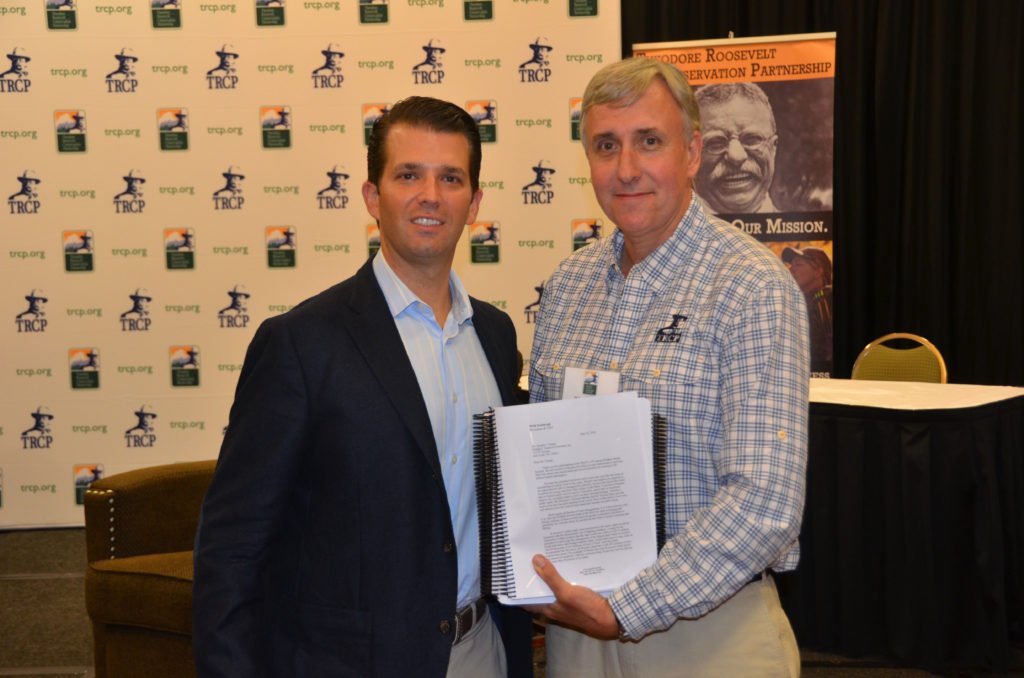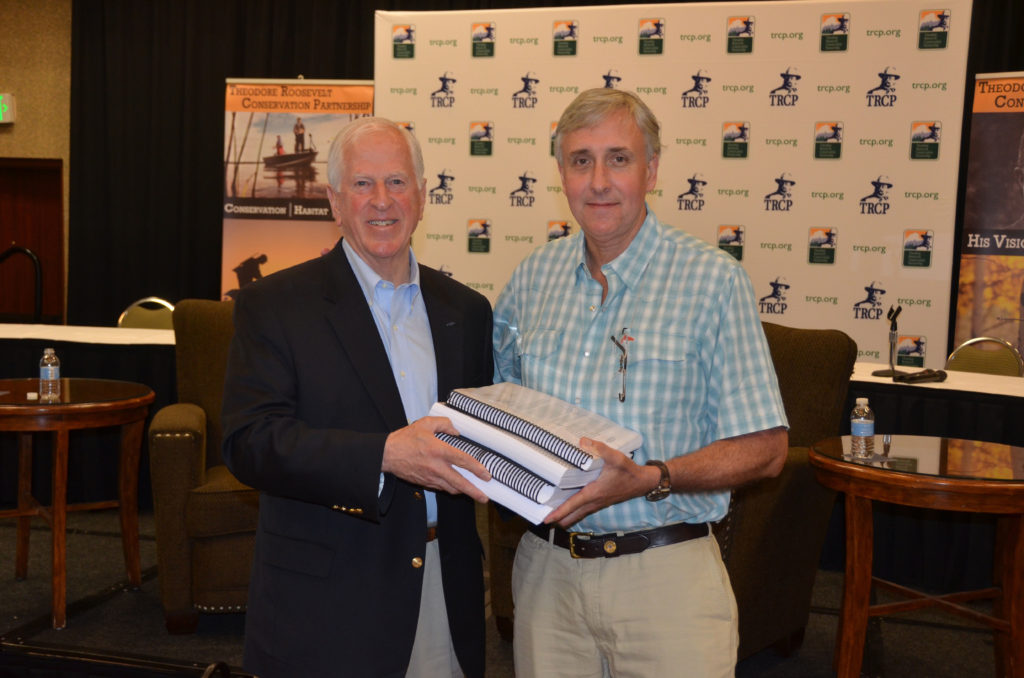Editor’s Note:
The following is a recap of the TRCP‘s 14th annual Western Media Summit, hosted in Fort Collins, Colo., from June 22 to 24 where the discussions and panel stressed the value of growing conservation champions by urging elected officials—from statehouses to the White House—to deliver on three basic principles. Although we’re a Canadian based publication we know how important these issues are to our American audience and we are watching these issues and the election that will impact them very closely. If you’re not familiar with the TRCP you should be.
Without quality fish and wildlife habitat, public access to hunting and fishing, and a balanced approach to harnessing the economic value of our natural resources, our American sporting heritage would cease to exist. Think of the costs: Our jobs, communities, and the conservation funding made possible through license sales and other purchases, yes, but I’d also add family bonding time, personal health, spiritual inspiration, mental and physical challenges, and our primal connections to the land.
It’s not enough to personally fight the fight for healthy habitat, clean water, access, and opportunity. We need to create more champions in Washington and statehouses across the country, where battles are waged every day to stamp out bad conservation policy and threats to our hunting and fishing opportunities, to stand behind this basic sportsmen’s platform.
In a presidential election year with extremely high stakes, it’s no mistake that we brought together outdoor writers and editors to immerse themselves in these issues within a swing state that identifies heavily with outdoor recreation and access to our public lands and waters. In fact, Colorado was the perfect backdrop for tough, timely conversations about drought conditions, public land transfer, the strength of our outdoor recreation economy, and where the presidential candidates stand on these topics and others important to sportsmen.

These are the conversations that are organically taking place in many a Centennial State truck cab, including the one where I sat last Wednesday, riding back to town after a half-day of fishing the Cache la Poudre River with guide JB Bruning from St. Peter’s Fly Shop. I found that JB is as well-versed in the local water issues as any policy wonk in D.C., and that night, pollster Lori Weigel shared data showing that he’s probably not alone. Water conservation is a non-partisan issue unlike any other in the region, and these highly informed westerners are looking to the next administration to support responsible solutions for what is perhaps the new normal—high water demand, dwindling water resources, and other threats to habitat and access.

Sportsmen, of course, have some serious skin in the game—here in Colorado that includes coldwater fisheries that allow folks like JB, his boss, and his colleagues to pay the bills. Across the West, it’s access to millions of acres of national public lands that are at risk of being sold or transferred to the states. Will Trump or Clinton deliver for sportsmen? Mike Toth, special projects editor for Field & Stream magazine and our candidate forum moderator, spoke separately with campaign surrogates Donald Trump Jr. and Congressman Mike Thompson—both avid hunters—to find out.
Trump Jr. reiterated that his father has broken with traditional conservative dogma to oppose the sale of national public lands, although as a voice in the elder Trump’s ear on matters important to hunters and anglers, he would be open to giving the states more of a role in managing federal lands. “For the lands to remain federal is very important to us, because it’s all about access,” said Trump Jr. “The way the states want it is they want the transfer of these lands and they want it unrestricted. They want to be able to do whatever they want with it. So, lands that used to belong to the entire people now belong to the states, and two minutes later they can sell it to fund a deficit, because they can’t run the sort of deficits the federal government can over longer periods of time.”

According to Colorado’s Park County commissioner Mike Brazell, who weighed in on the possible local impacts of public land transfer for a panel discussion later in the day, this would surely mean residents, including sportsmen, leaving his county for somewhere with greater outdoor opportunities. “I can’t imagine what my constituents would do without these public lands—they’d likely move,” said Brazell. “It’s why people live here.” He added that state control of federal lands would strain county budgets, and Colorado State Senator Larry Crowder said he saw this struggle firsthand when the state tried to financially support Rocky Mountain National Park for just two weeks of the 2013 government shutdown. Opposition to the bad idea of land transfer was also a theme in Dan Ashe’s remarks over dinner that night. “We have to have zero tolerance, at every level of government, for divestiture of our public lands,” said the U.S. Fish and Wildlife Service Director. “We can’t let them get away with that.” You can read his speech on this subject in in its entirety here.
Trump Jr. also addressed the efficacy of the Endangered Species Act, the Land and Water Conservation Fund, and the possibility of an assault weapons ban, before taking a personal shot at Hillary Clinton’s lack of hunting experience. For the uncut video of the discussion, click here.
On Friday morning, Rep. Mike Thompson, speaking for the Democratic candidate, said sportsmen should take comfort in the fact that Clinton is up-front about not being a hunter. “When is the last time a presidential candidate said, ‘Hey, I don’t hunt’? Most of them go out and buy a yellow coat or orange coat and hold a shotgun or something. She’s been very honest about it. She says, ‘I’m not a hunter,’ but she supports hunting, she supports an individual’s right to own firearms,” said Thompson. He believes the fact that Clinton sent a true sportsman ally to address hunter and angler concerns shows that she takes the issues seriously, and he pointed to her stance on opening access into checkerboard public lands, opposing land transfer, vetoing legislation to overturn the Clean Water Rule, and doubling funding for the Land and Water Conservation Fund. Click here to watch the full conversation.
Funding was certainly on many minds during a panel discussion on Western water challenges, with leaders from the U.S. Department of Agriculture’s Natural Resource Conservation Service, Trout Unlimited, and the Colorado River Water Conservation District pointing to an overall need for flexible federal programs. This will be integral to innovative water conservation initiatives across the drought-stressed region, some inspired by work being done in the Gunnison River Basin, not far from Fort Collins. Programs like the Regional Conservation Partnership Program are helping to coordinate federal resources across entire watersheds in ways that are producing real benefits for people, fish, and farms. But, our panel cautioned, even greater coordination, particularly across federal agencies, is needed.

Which brings us back to the need to create more conservation champions at every level of government. We know that sportsmen like you are willing to step up. So are outdoor recreation businesses, like Eagle Claw in Denver—Mike Jackson, VP of sales, marketing, and product development for the long-tenured hook manufacturer, says the value of quality habitat to their consumers and employees cannot be understated. First Lite’s Ryan Callaghan agrees: “We couldn’t put a lot of innovation into our product if you didn’t have these places to roam.”
Partners outside the hook-and-bullet sphere, like the Outdoor Industry Association, are also behind us. “The Great Outdoors is like the highway system for getting our products used,” said Amy Roberts, executive director for OIA, an organization that saw the need to gather concrete data on the strength of the outdoor recreation economy. “A lot of lawmakers get excited when they see the numbers—not jobs versus the environment, but jobs tied to the environment,” explained Liz Hamilton, president of the Northwest Sportfishing Industry Association.
When all was said and done last week, I think we saw that, as much as the looming elections could set a new course, there is a lot of hope for sportsmen, habitat, and our uniquely American traditions. Hunters, anglers, conservation experts, and outdoor business leaders are smart, strategic, and, at times, unyielding. Surely we can persuade new allies to fight for policy that does right by all of us and the next generation of sportsmen.
About the Author:
Kristyn Brady joined the Theodore Roosevelt Conservation Partnership as the group’s media relations director in March 2015. Prior to the TRCP, Brady spent 6 years on the editorial staff of Field & Stream magazine, where she most recently served as assistant editor and Heroes of Conservation columnist.

